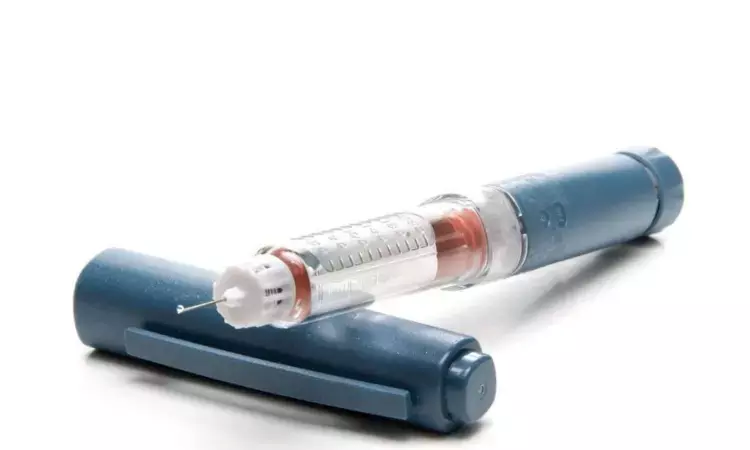- Home
- Medical news & Guidelines
- Anesthesiology
- Cardiology and CTVS
- Critical Care
- Dentistry
- Dermatology
- Diabetes and Endocrinology
- ENT
- Gastroenterology
- Medicine
- Nephrology
- Neurology
- Obstretics-Gynaecology
- Oncology
- Ophthalmology
- Orthopaedics
- Pediatrics-Neonatology
- Psychiatry
- Pulmonology
- Radiology
- Surgery
- Urology
- Laboratory Medicine
- Diet
- Nursing
- Paramedical
- Physiotherapy
- Health news
- Fact Check
- Bone Health Fact Check
- Brain Health Fact Check
- Cancer Related Fact Check
- Child Care Fact Check
- Dental and oral health fact check
- Diabetes and metabolic health fact check
- Diet and Nutrition Fact Check
- Eye and ENT Care Fact Check
- Fitness fact check
- Gut health fact check
- Heart health fact check
- Kidney health fact check
- Medical education fact check
- Men's health fact check
- Respiratory fact check
- Skin and hair care fact check
- Vaccine and Immunization fact check
- Women's health fact check
- AYUSH
- State News
- Andaman and Nicobar Islands
- Andhra Pradesh
- Arunachal Pradesh
- Assam
- Bihar
- Chandigarh
- Chattisgarh
- Dadra and Nagar Haveli
- Daman and Diu
- Delhi
- Goa
- Gujarat
- Haryana
- Himachal Pradesh
- Jammu & Kashmir
- Jharkhand
- Karnataka
- Kerala
- Ladakh
- Lakshadweep
- Madhya Pradesh
- Maharashtra
- Manipur
- Meghalaya
- Mizoram
- Nagaland
- Odisha
- Puducherry
- Punjab
- Rajasthan
- Sikkim
- Tamil Nadu
- Telangana
- Tripura
- Uttar Pradesh
- Uttrakhand
- West Bengal
- Medical Education
- Industry
Liraglutide improves FVC in type 2 diabetes patients: LIRALUNG Study

Spain: Liraglutide may increase forced vital capacity (FVC) in type 2 diabetes patients, finds a recent study. This effect was shown to be linked to a significant decrease in circulating serum levels of surfactant protein (SP-D) that may be beneficial for alveolar-capillary function in these patients. The study was published in the journal Diabetes on November 04, 2021.
Previous cross-sectional studies have shown decreased indices of forced expiration and lung volume and diffusion capacity in patients with type 2 diabetes versus age-matched healthy populations. This may be attributable to changes in lung elasticity and decreased muscle strength, which can be mediated by insulin resistance, advanced glycation end-products accumulation, and a proinflammatory state. Damage to the alveolar-capillary barrier causes a leak of the surfactant proteins A and D (SP-A and SP-D) from the alveolar space into the bloodstream and are useful systemic biomarkers for assessing lung injury. Also, experimental studies have shown that glucagon-like peptide 1 (GLP-1) improves lung fibrosis, thus causing a decrease in n serum SP-D levels.
Against the above background, Albert Lecube, Instituto de Salud Carlos III, Madrid, Spain, and colleagues aimed to test the impact of liraglutide, a GLP-1 receptor agonist (GLP-1RA), on pulmonary function and circulating levels of SP-D in type 2 diabetes patients in LIRALUNG Study.
LIRALUNG is a double-blind, randomized, crossover, placebo-controlled clinical trial consisting of 76 patients with a baseline forced expiratory volume in 1 s <90% of that predicted. Liraglutide administration was done for 7 weeks (2 weeks of titration plus 5 weeks at 1.8 mg daily). The short duration was intentional to minimize weight loss as a potential confounding factor. Serum SP-D levels were used as a biomarker of alveolar-capillary barrier integrity.
Following were the study's key findings:
- Liraglutide exerted a positive impact on forced vital capacity (FVC) in comparison with placebo (ΔFVC 5.2% of predicted).
- No differences in the other pulmonary variables were observed.
- Participants under liraglutide treatment also experienced a decrease in serum SP-D.
- The absolute change in FVC correlated with final serum SP-D in participants receiving liraglutide (r = −0.313).
- Stepwise multivariate regression analysis showed that final serum SP-D independently predicted changes in FVC.
"Our results of the LIRALUNG study showed that short-term administration of liraglutide produces a significant increase of FVC," the authors wrote in conclusion. "There is a need for long-term studies with more patients to confirm our initial results and for understanding the underlying mechanisms."
Reference:
Carolina López-Cano, Andreea Ciudin, Enric Sánchez, Francisco J. Tinahones, Ferran Barbé, Mireia Dalmases, Marta García-Ramírez, Alfonso Soto, Anna Michela Gaeta, Silvia Pellitero, Raquel Martí, Cristina Hernández, Rafael Simó, Albert Lecube; Liraglutide Improves Forced Vital Capacity in Individuals With Type 2 Diabetes: Data From the Randomized Crossover LIRALUNG Study. Diabetes 1 February 2022; 71 (2): 315–320. https://doi.org/10.2337/db21-0688
Dr Kamal Kant Kohli-MBBS, DTCD- a chest specialist with more than 30 years of practice and a flair for writing clinical articles, Dr Kamal Kant Kohli joined Medical Dialogues as a Chief Editor of Medical News. Besides writing articles, as an editor, he proofreads and verifies all the medical content published on Medical Dialogues including those coming from journals, studies,medical conferences,guidelines etc. Email: drkohli@medicaldialogues.in. Contact no. 011-43720751


